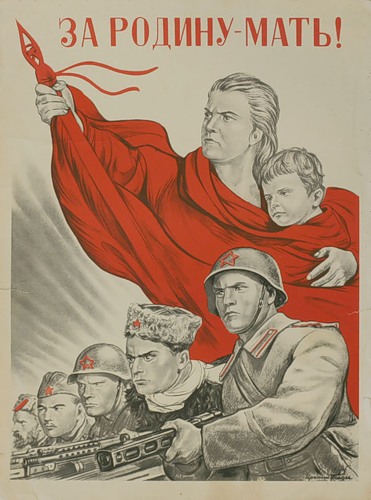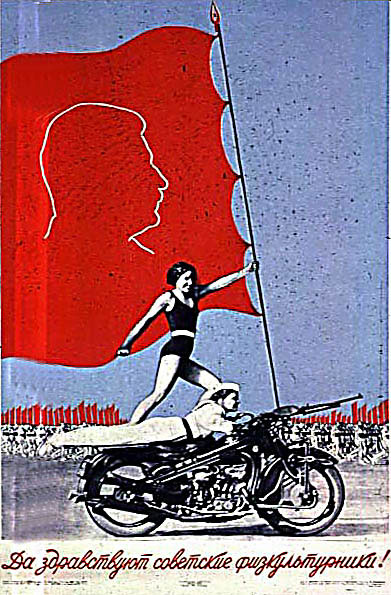The tactical moves by the Germany army in WWII in the Eastern Front are still both impressive and painfully full of failure when we take a look at the campaign. The initial invasion saw so much potential for total victory: the ferocity of Blitzkrieg attacks, Germany’s technical superiority, and the sheer element of surprise invasion. […]
Monthly Archives: October 2014
Uncategorized
Katyn Forest Massacre
by kathaskew •
In 1943, Nazi Germany announced the discovery of a mass grave site in the Katyn Forest. They announced that they discovered a ditch “28 meters long and 16 meters wide, in which the bodies of 3,000 Polish officers were piled … Continue reading →
Uncategorized
Car Trouble
by zmartin •
Most of the time it is hard to say what was worst; communism or fascism. However, sometimes it is really easy. Communism was the worst. If fascist states have one thing going for them, it is their superiority in the automotive industry. Germany alone had more car companies than the Soviet Union had car models. … Continue reading »
Uncategorized
Pay No Attention to Us
by phillip5 •
Soviet Partisans played a major part in the soviet victory against the Germans in the Great Patriotic War. As Germans moved deeper into Russia, it became apparent an extra edge was going to be needed to defeat the advancing German lines. From the start of the war, partisan forces began using guerrilla warfare tactics […]
Week 8 Posts
Hit the road, Jack: Deportation and Western Xenophobia in Soviet Russia
by cpurvis2 •
During World War II and even post-war, the Soviet Union was infamous for its deportation and xenophobic policies. This began in 1943, as the NKVD marched one million ethnic minorities, in particular the Kalmyks, from their homes into what is … Continue reading →
Motherblog Central Directives
Terror and Triumph in the Thirties
by A Nelson •
If the Soviet thirties were the worst of times for many, for others they were among the best. The posts this week reflected that dichotomy, and one of the main themes that comes from looking at all of the submissions is the amazing juxtaposition of achievement and success (building the Metro, mass marketing “champagne,” investing in a “happy childhood,” cultivating enthusiasm for physical fitness) against the trauma and tragedy of the Purges and the Stalinist dictatorship. We had a bumper crop of good posts this week, and the editorial team is delighted to bring back the weekly digest. Besides the wonderful posts featured in the slider, make sure to check out Comrades’ Corner, which has never been so crowded. Finally, a warm congratulations to the student choice winner and finalists.
And now, full steam ahead. The Great Patriotic war awaits!
Blogpost Guidelines, Motherblog Central Directives
Sixth Blogpost Guidelines
by A Nelson •

Irakli Toidze: (1943) Another in the Toidze series of recruiting posters.
Source: Natalia Vorontsova-Iur eva: Live Journal
This week we turn our attention to The Great Patriotic War (aka World War II) and the immediate post-war period. Please use one of the modules from 1943 or 1947 in Seventeen Moments in Soviet History on-line archive. You may also use the module on Soviet Territorial Annexations from 1939. You should consult Ch. 12 in the Freeze text. If you are writing about something specific to the war, it would be worth considering William C. Fuller’s discussion on pp. 383-392 of Freeze about the reasons for Soviet victory. You may focus on an event, a development or an individual. Your post should use (and cite) primary sources (texts, music, or images). You may also use a particular image or primary document as a focal point for your post. There’s plenty of action, drama, and complexity to keep us all engaged this week. Не шага назад!
Week 7 Posts
Tattle Tale Turned Hero
by caitlin6 •
A young boy Named Pavlik Morozov is known as a hero throughout Russia for turning his father in for his wrong doings. He had told the Soviet secret police that his father had been aiding kulaks, who at the time … Continue reading →
Uncategorized
Rehabilitation of Cossack Divisions
by GPittard •
The life of Russians in the 1930’s is truly interesting. The people of Russia have finally become one with their halfway communistic society. Although a large majority of people had become adjusted to the Soviet, certain portions of society weren’t warming up to the Reds like everyone else. One of these groups is the well-known […]
Uncategorized
Working the 9 to 5 and Then Some
by phillip5 •
Now that Russia had entered a new era of Bolshevism, labor dicipline became a major issue. Russia was in an attempt to show its power to the world. This meant everything Russian must impress. From their olympic sports teams right down to there average citizens in the workplace. Lenin himself had pegged Labor dicipline as […]
